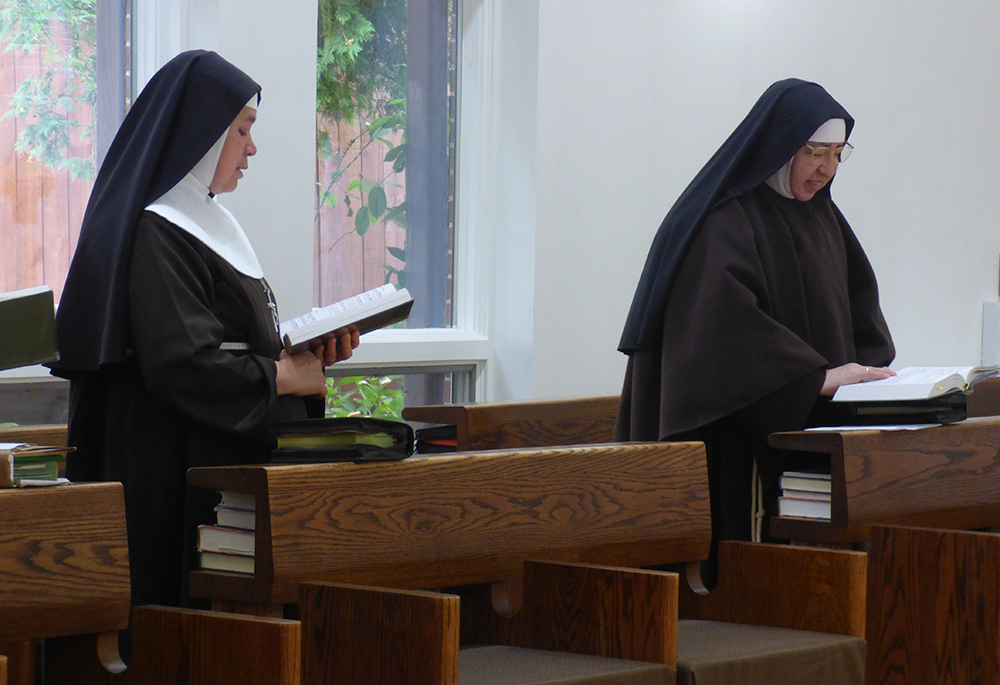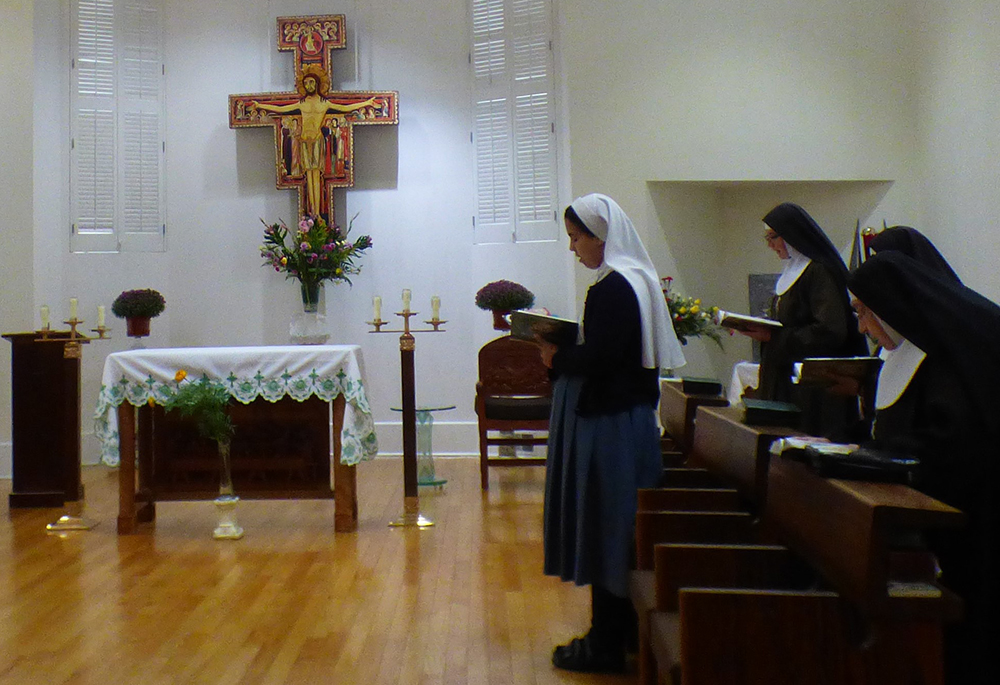
Capuchin Poor Clare Srs. Maria Elena Romero, left, and Maria de la Luz Solorio, pray the Liturgy of the Hours Sept. 27 at the Veronica Giuliani Monastery in Wilmington, Delaware. Contemplative life will participate in spirit and pray for those present at the synod so that all voices are heard, said Romero. (GSR photo/Rhina Guidos)
Sr. Maria Elena Romero compares the work of contemplative life in this historic Synod of Bishops to that of the soldiers who guard for attacks in the rear of a mass of soldiers during battle.
"There are bishops, cardinals, including the Holy Father, who know that contemplative communities can generate strength for the entire church," said Romero, a Capuchin Poor Clare at the Veronica Giuliani Monastery in Wilmington, Delaware. "I think they put a lot of trust, in this case, in us, that from here we're giving off a little bit of light."
Though women are present as voting members for the first time in a Synod of Bishops, and include women religious who will vote, contemplative life, physically, is absent from the synod hall, and yet "we're not oblivious to what is happening" in the synod, Romero said.
"Truly, the responsibility that we have, is really quite a strong responsibility, because this is not seen — our lives are not seen — but it is quite strong," she told Global Sisters Report. "That is why I believe that some bishops, including the Holy Father Francis, take this into account."
In September, Cardinal Mario Grech, the synod's general secretary, echoing an earlier message by Pope Francis, asked Catholics to pray for the synod, saying that without prayer, "there will be no synod."
"The Synod is, above all, an event of prayer and listening that involves not only the members of the Synodal Assembly, but every baptized person and every particular Church," Grech said in a letter on the topic in September. "Indeed, all of us are called at this time to unite in communion of prayer and insistent invocation of the Holy Spirit to guide us in discerning what the Lord is asking of his Church today."
And that is exactly what the sisters in Wilmington, and the benefactors who sometimes join them, will be praying for, said Sr. Maria de la Luz Solorio.

A community of Capuchin Poor Clares, a contemplative order, pray the Liturgy of the Hours Sept. 27 at the Veronica Giuliani Monastery in Wilmington, Delaware. The sisters said they will be praying for those participating in the synod. (GSR photo/Rhina Guidos)
Like a lot of contemplative communities, the Capuchin Poor Clares structure their daily schedule around prayer, and their contact with the outside world is limited. The Wilmington Poor Clares allow some moments for the public to come and pray with them in their small chapel near a neighborhood close to busy downtown Wilmington. In their case, that includes many Spanish-speaking immigrants and others who have contact with the dozen or so Poor Clares, many of whom come originally from Mexico.
Officials from the Diocese of Wilmington visited the community to explain the synod, what it was about, "but they said our main involvement was how to take [the synod] into consideration" through the individual prayers of sisters as well as during community prayer, Capuchin Sr. Leticia Gomez told GSR, adding that the convent's doors at this time "are open to anyone who wants to come to pray for this."
Solorio said in contemplative circles, there's a variety of ways sisters' prayer efforts are being carried out, with some contemplative communities organizing holy hours, or an entire day of prayer in which one person can sign up to pray an hour for the synod and its members.
Like many, the sisters said they, too, have hopes for what comes out of the synod process. For them, there's the worry of vocations; they hope that whatever happens will yield more members joining religious communities, including contemplative life. They also share worries of parents who call them about the lack of faith in the lives of their children, lack of unity and trust, an erosion of spirituality and rising interest in the individual instead of a communal focus.
But they're also watching with interest the role of women religious and women in general in the synodal process.
"I think it's something positive because this is taking place for the good of all humanity, right? For the good of the church and the people of God," and that includes women, Solorio said.
Romero shared concerns, however, what that would mean for "tradition," and said she worried about how changes could affect the church's values in favor of following humanity's winds of change, which isn't always a good path, in her opinion, she said. Many of those concerns come from what other people who call her at the monastery are saying, she said.
"So, I say, 'Yes, that has to be considered,' but I believe all of this can be done through prayer," she said. "And for me that's important for us as contemplatives, to focus our prayer life and ask God to help us to be able to send that light outward from here."







